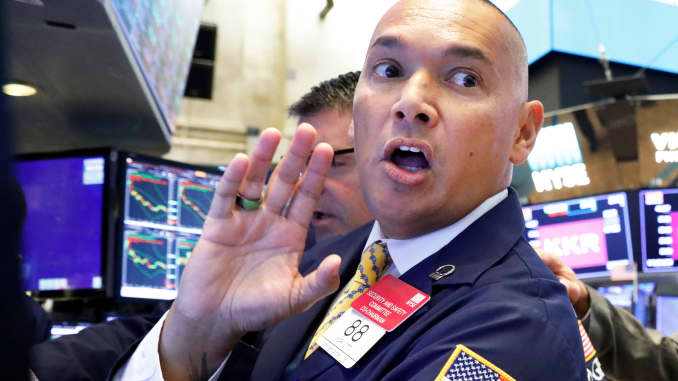The Dow Jones Industrial Average closed 313.98 points lower, or 1.2% at 26164.04. The S&P 500 slid 1.6% to 2,893.06 while the Nasdaq Composite dropped 1.7% to 7,823.78.
Stocks found some support after Federal Reserve Chairman Jerome Powell said the central bank will expand its balance sheet “soon.” He noted this measure will be used as a response to the recent funding issues the bond market faced in recent weeks.
To be sure, this is not quantitative easing. Rather, Powell was referring to a more gradual increase to the balance sheet.
Leading the broader market lower were bank shares. Citigroup, Bank of America and J.P. Morgan Chase slid more than 1% each. The S&P 500 industrials sectors pulled back 1.6%, led by declines in Caterpillar and Deere.
Big tech shares such as Facebook, Amazon and Alphabet declined as well. Semiconductor stocks dropped sharply as the VanEck Vectors Semiconductor ETF (SMH) closed 2.6% lower. Nvidia, On Semiconductor, Qualcomm and Nvidia were among the biggest decliners in the SMH.
“The China pressure is pivoting from being a one-issue situation to multiple pressures,” he said, noting companies are figuring out how much trade will impact them, but now have to contend with slower economic growth worries.
The South China Morning Post reported China is toning down its expectations ahead of trade negotiations with the United States. The report said Chinese Vice Premier Liu He — who will lead the country’s trade delegation — will not carry the title of “special envoy,” signaling he has not received any specific instructions by President Xi Jinping. U.S.-China trade talks are set to start Thursday.

However, there was some confusion about China’s intentions around trade. The Chinese state-owned Global Times said China is “sincerely” looking forward to reaching a trade deal with the U.S.
Bloomberg News also reported the White House is looking to limit Chinese stocks within government pension funds. Alibaba and JD.com U.S.-listed shares fell more than 3.5% each.
The White House has scheduled an increase in U.S. tariffs on $250 billion worth of Chinese goods to 30% from 25% on Oct. 15. President Donald Trump has said the tariff increase will take effect if no progress is made in bilateral trade negotiations.
“The U.S.-China trade talks are the clear highlight this week,” said Tom Essaye, founder of The Sevens Report. “Some sort of a trade truce that results in no more new tariffs is the clear market expectation. If that does not occur, this market is at risk of disappointment.”
The world’s two largest economies have imposed tariffs on billions of dollars’ worth of one another’s goods since the start of 2018, battering financial markets and souring business and consumer sentiment.
On the data front, U.S. producer prices posted their biggest drop in eight months in September, dragged down by lower costs for goods and services. Producer prices are an indicator of inflation and a decline could give the Federal Reserve more room to ease monetary policy.
